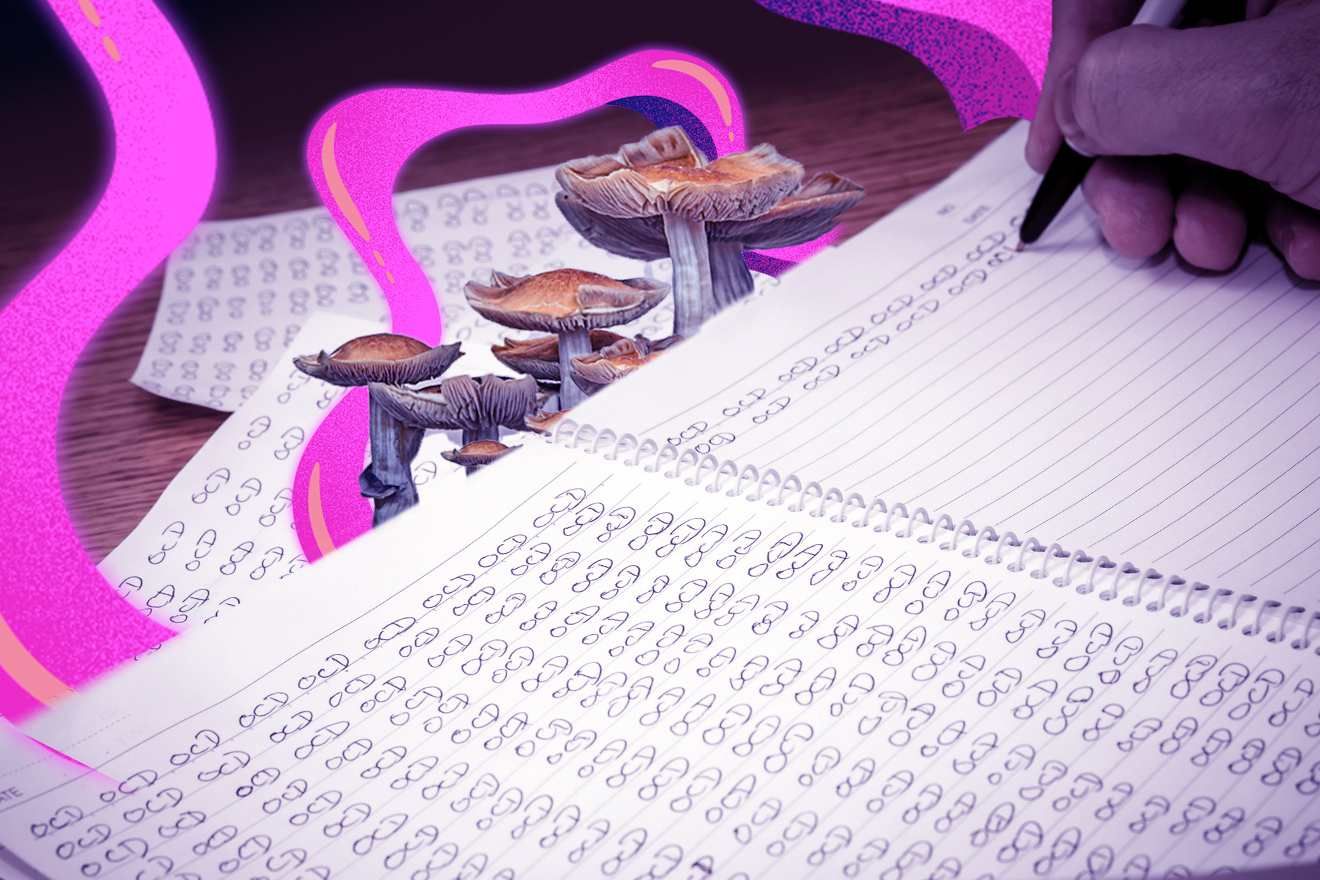Treating obsessive-compulsive disorder (OCD) with psilocybin is an emerging field of healing. Psilocybin therapy has been shown to potentially treat a number of mental health issues, including depression, anxiety, addictions, PTSD and other mental health disorders. Here’s the latest on its use for OCD.
OCD is a chronic mental health disorder where a person experiences persistent uncontrollable, unwanted thoughts (obsessions) and develops compulsive behaviors as a way to reduce the anxiety associated with those thoughts.
It is a distressing condition and without treatment, can be debilitating and cause severe impairment in an individual’s ability to function. It is estimated that 2.3% of US adults will develop OCD within their lifetime.
Is Psilocybin Safe?
Psilocybin is found in over 200 species of “magic mushrooms”. It is a potent 5-HT(1A) and 5-HT(2A/2C) agonist that is chemically similar to the neurotransmitter serotonin (5-HT). In humans, there has been no evidence of psilocybin toxicity and it has a low-risk profile.
However, psilocybin can worsen a person’s existing mental health condition, especially when taken in non-clinical settings. Several negative side effects have been documented in the use of psilocybin including panic attacks, risk of psychosis, anxiety, confusion, paranoia, increased heart rate and others.
Psilocybin has a few contraindications. It has not been deemed safe for those with schizophrenia, bipolar disorder, borderline personality disorder, cardiovascular issues, uncontrollable blood pressure and those who are pregnant or lactating.
A 2006 study looked at the safety, tolerability, and efficacy of psilocybin in those with OCD. It included 9 patients with DSM-IV-defined OCD and no other major psychiatric disorders. Participants were given up to 4 single doses of synthetic psilocybin that ranged from sub-perceptual to deeply psychedelic. The form of administration was ingestion. Specifically, the following doses were used:
- Low (100 microgram/kg)
- Medium (200 microgram/kg)
- High (300 microgram/kg)
A very low dose (25 microgram/kg) was given in a double-blind, randomized order after the first dose. Each session took over 8 hours and was conducted at an outpatient clinic in a controlled environment.
OCD symptoms were assessed at 0, 4, 8, and twenty-four hours post-ingestion using the Yale-Brown Obsessive Compulsive Scale (YBOCS) and a visual analog scale.
The results showed that all of the participants had a reduction in OCD symptoms with improvements lasting over 24 hours. The study concluded that psilocybin was associated with a decrease in core OCD symptoms and can safely be used in patients with OCD in a controlled clinical environment.
Treating OCD with Psilocybin
Most people with OCD respond to standard treatment which includes medication and psychotherapy. However, some people continue to experience symptoms; there are preliminary but promising results that show that psilocybin may be helpful for those who do not respond to usual treatment.
A recent case report that looked at single-dose psilocybin as a treatment for OCD was published in December 2022. A patient with treatment-resistant OCD was given psilocybin. Follow-ups were conducted over the course of a year to understand the qualitative and quantitative detail of the experience during and after treatment.
The subject’s OCD symptoms, as measured by the YBOCS, improved from 24 to 0–2; in addition, they reported positive changes to their quality of life including emotional and social well-being and work function. The report indicated that the subject was an early participant in an ongoing clinical trial that was looking at treating OCD with psilocybin.
Although the case report focused on one patient, the researchers concluded that these initial findings support the therapeutic potential of psilocybin for those with OCD.
How is Psilocybin Used in Treating OCD Symptoms?
Although it is not completely understood how psilocybin works to ease OCD symptoms, researchers suggest there are several potential mechanisms to explain its effect.
Changes in The Activity of Serotonin Receptors
As mentioned above, the chemical structure of psilocybin is similar to serotonin. After consuming psilocybin, it breaks down into psilocin. Psilocin interacts with different serotonin receptors in the brain.
It is suggested that psilocybin may change the binding activity of the serotonin receptors in the parts of the brain where OCD implicates. Therefore, psilocybin dosage may decrease OCD symptoms.
“Resets” a Dysfunctional Default Mode Network (DMN)
Psilocybin may help reduce obsessions, rumination and unwanted thoughts by regulating the Default Mode Network (DMN), a large interconnected group of brain structures that are associated with self-referential cognitive processing such as self-reflection and daydreaming. It has been shown that those with OCD have excessive self-referential cognitive activity and DMN dysfunction.
It is hypothesized that psilocybin may change DMN activity by causing a “reset” in functional connectivity for those with OCD. As a result, normal responsiveness towards the environment is re-established which leads to a decrease in OCD symptoms.
A Transformative “Mystical Experience”
When psilocin attaches to the 5-HT2A serotonin receptor, it causes psychedelic effects which can create a transformative “Mystical Experience” for the person.
Other psychoactive effects of psilocybin include euphoria, synesthesia, a distorted sense of time, changes in perception and emotional lability. These effects may contribute to reduced stress, improved mood and sense of well-being and decreased symptoms of OCD.
The Future of Psilocybin and OCD
Dr. Francisco Moreno, Professor of Psychiatry at the University of Arizona, and his team are leading research that focuses on the use of psilocybin as a new way to manage OCD symptoms.
In an interview conducted by the University of Arizona in 2020 with Dr. Morena, he was asked what he would want society to know about using psilocybin to help with an OCD diagnosis. His response was the following:
“It is not often in the field of psychiatry that we find a treatment that may immediately and significantly change an individual’s symptoms that have been present for years. Treatment with psilocybin, when done in an interpersonally supportive setting with a well-prepared individual, is not only safe but may result in rapid and significant reductions in overall OCD symptoms and a general improvement in overall quality of life. Psilocybin represents a paradigm shift in the treatment approach to OCD as well as other mental health conditions including depression and addiction. If psilocybin shows to be safe and effective in current trials, it may advance our ability to develop new therapies to best serve people suffering from OCD.”
There is still a lack of conclusive research on psilocybin as a treatment for OCD. However, there are clinical research trials currently being conducted to understand the relationship between psilocybin and various mental health conditions.
Follow your Curiosity
Sign up to receive our free psychedelic courses, 45 page eBook, and special offers delivered to your inbox.For example, Yale University is conducting a phase I clinical trial that is looking at the psychological mechanisms that may mediate the therapeutic effects of repeated psilocybin dosing in those with OCD. The estimated start date is in April 2023 with an estimated completion date in April 2027.
If you are interested in joining a psilocybin clinical research trial, there are many important things to consider. Check out this article that explains what to expect, eligibility, understanding who is sponsoring these trials, the benefits of participating and how to get involved.
For a deeper dive on psilocybin and its effects, be sure to check out our course, “Understanding Psilocybin, Effects, Neurobiology, and Therapeutic Approaches” – the course is on sale now!
And If you’re interested in learning more about becoming certified in psychedelic-assisted therapy, be sure to visit our page about psychotherapy training programs for more details.
References
- Fa, M., Cb, W., Ek, T., & Pl, D. (2006, November 1). Safety, Tolerability, and Efficacy of Psilocybin in 9 Patients With Obsessive-Compulsive Disorder. The Journal of Clinical Psychiatry. https://pubmed.ncbi.nlm.nih.gov/17196053/
- Jacobs, E. (2020). A potential role for psilocybin in the treatment of obsessive-compulsive disorder. Journal of Psychedelic Studies, 4(2), 77–87. https://doi.org/10.1556/2054.2020.00128
- Kelmendi, B., Kichuk, S. A., DePalmer, G., Maloney, G., Ching, T. H. W., Belser, A., & Pittenger, C. (2022). Single-dose psilocybin for treatment-resistant obsessive-compulsive disorder: A case report. Heliyon, 8(12), e12135. https://doi.org/10.1016/j.heliyon.2022.e12135
- National Institute of Mental Health. (2003). NIMH» Obsessive-Compulsive Disorder (OCD). www.nimh.nih.gov. https://www.nimh.nih.gov/health/statistics/obsessive-compulsive-disorder-ocd
- NIMH» Obsessive-Compulsive Disorder. (n.d.). www.nimh.nih.gov. https://www.nimh.nih.gov/health/topics/obsessive-compulsive-disorder-ocd#part_2228
- Psilocybin and OCD | The Department of Psychiatry, University of Arizona Health Sciences. (2020). Psychiatry.arizona.edu. https://psychiatry.arizona.edu/news/psilocybin-and-ocd






